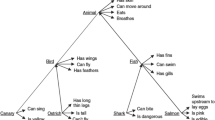Abstract
This study investigated the availability of deductive reasoning competence in late adulthood. Forty-six Japanese older (mean age =71 years) and 58 Japanese young adults (mean age =19.6 years) were assessed for formal or deductive reasoning using Overton's (1990) revision of the four-card selection task. For older adults, metacognitive strategy—operating as a procedure designed to access reasoning competence—resulted in enhanced performance levels. When the semantic content of the reasoning task involved emotional issues, however, the metacognitive strategy failed to facilitate reasoning performance. This suggests that reasoning competence is available in late adulthood but that performance is susceptible to contextual variables. Social factors were not significantly related to older adults' reasoning performance. Thus, assessment of these factors may have been based on too broad a definition to describe adequately the status of the older adults. For the young, only semantic task content was related to reasoning performance.
Similar content being viewed by others
References
Arenberg, D. (1968). Concept problem solving in old and young adults.Journal of Gerontology, 23, 279–282.
Arenberg, D. (1982). Changes with age in problem solving. In F. I. M. Craik & S. Trehub (Eds.),Aging and cognitive processes. New York: Plenum Press.
Baker, L. (1989). Metacognition, comprehension monitoring, and the adult reader.Educational Psychology Review, 1, 3–38.
Blackburn, J. A. (1984). The influence of personality, curriculum, and memory correlates on formal reasoning in young adults and elderly persons.Journal of Gerontology, 39, 207–209.
Brown, M. B., & Forsythe, A. B. (1974). Robust tests for the equality of variances.Journal of American Statistical Association, 69, 364–367.
Cohen, G. (1981). Inferential reasoning in old age.Cognition, 9, 59–72.
Clayton, V., & Overton, W. F. (1976). Concrete and formal operational thought processes in young adulthood and old age.International Journal of Aging and Human Development, 77, 237–245.
Devolder, P. A., & Pressley, M. (1991). Memory complaints in young and older adults.Applied Cognitive Psychology, 5, 443–454.
Evans, J. St. B. T. (1982).The psychology of deductive reasoning. London: Routledge & Kegan Paul.
Foltz, C., Overton, W. F., & Ricco, R. B. (1995). Proof construction: Adolescent development from inductive to deductive problem solving strategies.Journal of Experimental Child Psychology, 59, 179–195.
Hartley, A. A. (1981). Adult age differences in deductive reasoning processes.Journal of Gerontology, 6, 700–706.
Hasher, L., & Zacks, R. T. (1989). Working memory, comprehension, and aging: A review and a new view. In G. H. Bower (Ed.),The psychology of learning and motivation: Advances in research and theory, (Vol. 22, pp. 193–225). San Diego, CA: Academic Press.
Inhelder, B., & Piaget, J. (1958).The growth of logical thinking from childhood to adolescence. New York: Basic Books.
Jacobs, J. E., & Paris, S. G. (1987). Children's metacognition about reading: Issues in definition, measurement, and instruction.Educational Psychologist, 22, 255–278.
Kesler, M. S., Denny, N. W., & Whitney, S. E. (1976). Factors influencing problem solving in the middle-aged and elderly.Human Development, 19, 310–320.
Kodansha Encyclopedia of Japan. (1983). Tokyo, Japan: Kodansha.
Mwamwenda, T. S. (1993). Formal operations and academic achievement.Journal of Psychology, 127, 99–103.
Nakagaki, A. (1989). Degeneration effect on logical reasoning in the abstract four card problem.Japanese Journal of Educational Psychology, 37, 36–45.
Overton, W. F. (1990). Competence and procedures: Constraints on the development of logical reasoning. In W. F. Overton (Ed.),Reasoning, necessity, and logic: Developmental perspectives (pp. 1–32). Hillsdale, NJ: Erlbaum.
Overton, W. F., & Franco, R. (1984).Deductive reasoning in young and elderly adults: A competence-moderator-performance approach. Paper presented at the biennial meeting, Southeastern Conference on Human Development, Athens, GA.
Overton, W. F., Pollack, R. D., & Rosenfeld, A. (1989).Deductive reasoning: A life-span approach. Poster presented at the American Psychology Society Convention, Alexandria, Va.
Overton, W. F., Ward, S. L., Noveck, I. A., Black, J., & O'Brian, D. P. (1987). Form and content in the development of deductive reasoning.Developmental Psychology, 23, 22–30.
Overton, W. F., Yaure, R., & Ward, S. L. (1986).Eductive reasoning in young and elderly adults. Paper presented at the Southeastern Conference of Human Development, Nashville, TN.
Palmore, E., & Maeda, D. (1985).The honorable elders revisited: A revised cross-cultural analysis of aging in Japan. Durham, NC: Duke University.
Piaget, J. (1972). Intellectual evolution from adolescence to adulthood.Human Development, 15, 1–12.
Pollack, R. D., Overton, W. F., Rosenfeld, A., & Rosenfeld, R. (1995). Formal reasoning and late adulthood: Role of semantic content and metacognitive strategy.Journal of Adult Development, 2, 1–14.
Saiki, J. (1991). Reasoning with hypothetical situation models.Japanese Journal of Educational Psychology, 39, 1–10.
Schaie, K. W. (1977). Quasi-experimental research designs in the psychology of aging. In J. E. Birren & K. W. Schaie (Eds.),Handbook of the psychology of aging (2nd ed., pp. 39–58). New York: Academic Press.
Schulz, R. (1985). Emotion and affect. In J. E. Birren & K. W. Schaie (Eds.),Handbook of the psychology of aging (2nd ed., pp. 531–543). New York: Academic Press.
Statistics Bureau, Management & Coordination Agency (1993).Statistical handbook of Japan. Tokyo, Japan: Author.
Ward, S. L., & Overton, W. F. (1990). Semantic, familiarity, relevance, and the development of deductive reasoning.Developmental Psychology, 26, 488–493.
Wason, P. C. (1983). Realism and rationality in the selection task. In J. St. B. T. Evans (Ed.),Thinking and reasoning: Psychological approach (pp. 44–75). London: Routledge & Kegan Paul.
Wason, P. C. (1992). The theory of formal operations—A critique. In L. Smith (Ed.),Jean Piaget: Critical assessment (Vol. I, pp. 186–200. London: Routledge.
Wellman, H. M. (1985). Effective studying from text: Applying metacognitive strategies.Forum for Reading, 16, 46–55.
Author information
Authors and Affiliations
Rights and permissions
About this article
Cite this article
Takahashi, M., Overton, W.F. Formal reasoning in Japanese older adults: The role of metacognitive strategy, task content, and social factors. J Adult Dev 3, 81–91 (1996). https://doi.org/10.1007/BF02278774
Issue Date:
DOI: https://doi.org/10.1007/BF02278774



